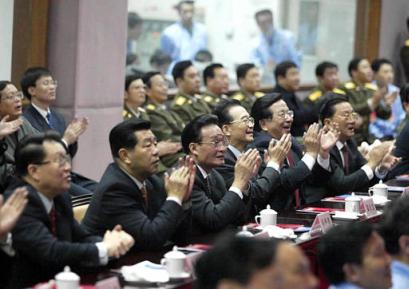Politburo Standing Committee of the Communist Party of China
|
|
Template:Politics of the People's Republic of China The Politburo Standing Committee of the Communist Party of China (Chinese: 中国共产党中央政治局常务委员会 pinyin: Zhōngguó Gòngchǎndǎng Zhōngyāng Zhèngzhìjú Chángwù Wěiyuánhuì) is a committee whose membership varies between 5 and 9 and includes the top leadership of the Communist Party of China. The inner workings of the PSC are not well known, although it is believed that decisions of the PSC are made by consensus. Formally the membership of the Committee is approved by the Central Committee. In practice, the membership of the PSC appears to be the result of negotiations among the top leadership of the Communist Party.
| Contents |
History
Although the PSC has existed since the beginning of the People's Republic of China, the actual power wielded by the PSC has varied wildly from period to period. During the Cultural Revolution, the PSC and the Communist Party of China were essentially powerless with actual power being in the Revolutionary Committees set up by Mao Zedong.
After taking power in 1978, one of the goals of Deng Xiaoping was to strengthen the power of the party, a goal which he ironically undermined in 1989 when he ordered the military to intervene in the Tiananmen Protests of 1989 against the wishes of a majority of the PSC, and in which the party subsequently ousted a majority of the PSC.
Although Jiang Zemin stepped down from this powerful committee to make way for a younger fourth generation of leadership led by Hu Jintao, Jiang may continue to wield significant influence. Five or six out of the nine new members of the Standing Committee, Wu Bangguo, Jia Qinglin, Zeng Qinghong, Huang Ju, Li Changchun and sometimes Wu Guanzheng are Jiang protégés. The 22-member Politburo is elected by the Party's central committee. At the 2002 16th Party Congress, the Standing Committee was expanded to include nine members.
Current members

The current members of the 16th PSC are (as of 2003):
- Hu Jintao - President of the People's Republic of China, General Secretary of the CPC, Chairman of the Central Military Commission.
- Wu Bangguo - Chairman of the Standing Committee of the National People's Congress
- Wen Jiabao - Premier of the State Council of the People's Republic of China
- Jia Qinglin - Chairman of the People's Political Consultative Conference
- Zeng Qinghong - Vice-President of the People's Republic of China
- Huang Ju - Vice Premier, State Council of China
- Wu Guanzheng - Secretary of the Central Commission for Discipline Inspection
- Li Changchun - no other positions held, known to many as the propaganda chief
- Luo Gan - State Councilor, Political and Legislative Affairs Committee secretary
Historical makeup of the PSC
15th PSC (1997 - 2002)
- Jiang Zemin (also General Secretary, Chinese Communist Party; President, People's Republic of China; Chairman, Central Military Commission)
- Li Peng (also Chairman, Standing Committee of the National People's Congress)
- Zhu Rongji (also Premier of the State Council)
- Li Ruihuan (also Chairman, Chinese People's Political Consultative Conference)
- Hu Jintao (also Vice President, People's Republic of China; Vice Chairman, Central Military Commission)
- Wei Jianxing (also Secretary, Central Disciplinary Inspection Commission)
- Li Lanqing (also Executive Vice Premier)
14th PSC (1992 - 1997)
13th PSC (1987 - 1992)
12th PSC (1982 - 1987)
11th PSC (1977 - 1982)
10th PSC (1973 - 1977)
- Mao Zedong
- Zhou Enlai
- Dong Biwu
- Kang Sheng
- Li Desheng
- Wang Hongwen
- Ye Jianying
- Zhang Chunqiao
- Zhu De
9th PSC (1969 - 1973)
8th PSC (1956 - 1969)
1st to 7th "De facto" PSC (pre 1956) Often known as the "Big Five".
